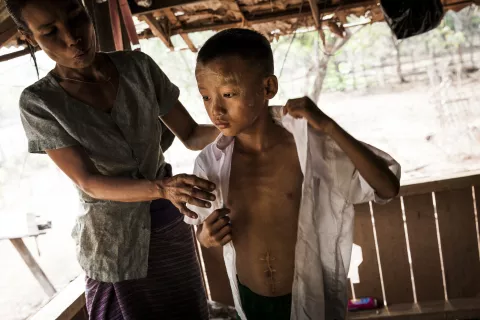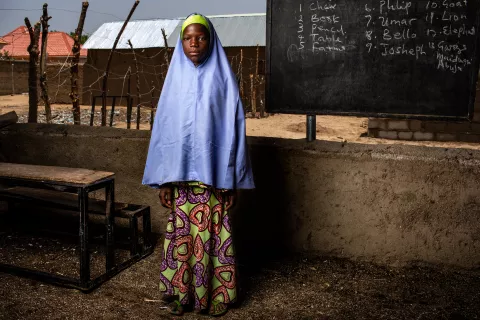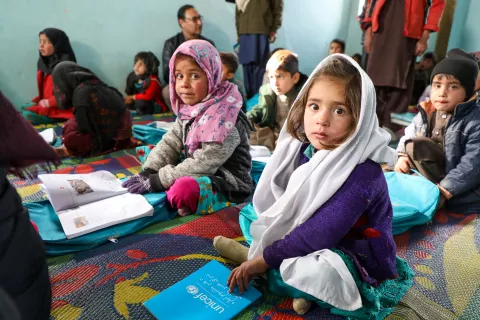The lasting scars of conflict in Iraq
Explosive weapons are one of the most devastating threats to children during armed conflicts – but also after.

Long after a conflict has ended – after the terrifying sounds of gunfire, mortars and rockets have gradually faded – the impact of explosive weapons can reverberate for years to come. Landmines and unexploded or abandoned ordnance continue to kill and maim children and their families, leaving lasting scars both physical and psychological. Iraq remains among the countries most contaminated with explosive objects, which still severely injure children just trying to go about daily life – walking to school, helping with chores or playing with friends.


Hussein was playing soccer with his brother when an object exploded under his feet, tearing open his stomach and taking off part of his right ear. “We hit something, gunpowder came out, and then it exploded,” Hussein says. “I don’t remember anything else.” Hussein, 5, and his brother now live with their grandmother at a camp for internally displaced persons in Anbar. Hussein’s family say he has been traumatized by the explosion, which took place in November 2021, and that he’s now sometimes aggressive with people at home.

Muqtada was 16 when an object exploded outside, badly injuring him. He dragged himself towards an approaching car, hoping to get help. The driver stopped but was scared to get out of the car in case there were landmines in the area. Muqtada managed to pull himself into the car before passing out. He doesn’t remember anything about the explosion, just waking up in the hospital without one of his legs. “I used to play soccer every day and go out with my friends. Now I can’t do that,” he says.


The only thing Zainab remembers about the blast was the searing heat. Five days later, she woke up in a hospital in the Basra region in southern Iraq, with burns on her body and shrapnel embedded in her eyes. She was greeted with devastating news – her mother had died in the explosion. Zainab was also told she wouldn’t be able to see again, like she used to, due to damage to her eyes.
“When I think of her, I start to cry. I lost my eyes, and I lost my mother,” Zainab says. “She was my whole life. I miss seeing her.”
Zainab says she wants to go back to school, but that schools in her area aren’t able to properly support someone with a disability like hers. She says that for now, she relies on her older brother, Abdel, for almost everything. But she is determined to continue her education. “I don’t lose hope,” she says. “I want to go to India to have surgery and return to school soon.”


In Iraq, as in other countries, children are particularly vulnerable to unexploded remnants, attracted to them for their sometimes colourful appearance and unaware of how dangerous they are. Some of these weapons are familiar household objects that have been turned into explosives.

Noor’s hands tremble as she recounts an attack in 2017. “We lost thirteen relatives the day of the attack, including my mother,” she says. Noor falls silent as she recalls the incident, glancing at her uncle for reassurance. The devastation is hard to fully comprehend, but the family is hoping for better times ahead. They recently welcomed a new baby – Noor’s niece.



Hanan, 11, was helping her father with some livestock when an object exploded, throwing both of them into the air. Hanan’s father lost his arm and almost all of his vision, while she was left with burns and other wounds. “My stomach was hurt. I stayed in the hospital for two months because there was shrapnel in my body and in my eyes,” Hanan says, recalling the impact of the day her life changed forever. She says she doesn’t really leave her house anymore, and that she isn’t interested in doing things other children her age like doing.


Years of conflict have left a massive gap between the support required by children grappling with the impact violence and the resources available to help.


Ali, 17, lost both of his hands during shelling in western Mosul in 2017 when he got caught in the middle of fighting. “Life is very complicated” since the shelling, says Ali, who now uses a prosthetic arm. “I had to drop out of school because I couldn’t stand being bullied.” Ali says it has been difficult to find work because potential employers don’t think he can do certain jobs. “I’d like to work in a store. I see myself as capable and useful, despite my disability,” he says.

As well as the physical effects, survivors of explosive ordnance often experience a range of social consequences, including separation from – or discrimination by – family and community members, difficulties becoming economically self-sufficient, and fewer opportunities for marriage. Amputees are also often vulnerable to social stigmatization, rejection and unemployment.

In 2021, 125 children were killed or maimed by explosive remnants of war and other explosive ordnance in Iraq. UNICEF is therefore working with partners in Iraq to strengthen child protection systems and programming on risk education. The same year, UNICEF in Iraq reached almost 69,000 at-risk children and trained more than 4,000 professionals in explosive ordnance risk education, to reduce children’s risk of being injured or killed.


“We meet many families and victims, especially children. Sometimes their psychological state is concerning,” says Aya, a field officer at Bustan, an NGO supported by UNICEF. “The children can’t talk about what happened due to the shock they experienced. They keep the pain inside since they are little.” Aya’s work consists of raising awareness about the dangers of explosive remnants of war, particularly among children.

In 2013, a simple trip to the supermarket with her parents changed Dalia’s life forever. The family were out buying notebooks for the new school year. They had no way of knowing that someone had glued explosives to the bottom of a shopping cart. Dozens of people were killed in the blast. Dalia remembers hearing the screams and seeing dismembered bodies through the smoke.
After spending several days in hospital, Dalia started to notice she couldn’t feel anything in her legs. “I missed two years of school due to the rehabilitation and school closures,” says Dalia, who now relies on a wheelchair to get around.
The devastation of Dalia’s story is all too familiar for children growing up in the shadow of conflict. But so is the strength and determination of survivors. “Despite my disability, my passion for numbers and math remains strong,” she says. “I’m really motivated to continue fighting for my dream of opening a business one day.”




